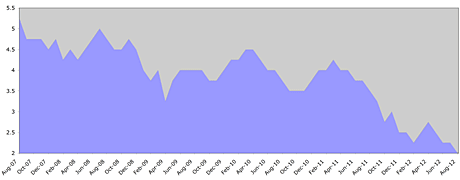It’s time to get rid of central bankers
Far from being the saviours of the world economy, central bankers are one of the main causes of the mess we're in today. Phil Oakley explains why we'd be better off without them.
Get the latest financial news, insights and expert analysis from our award-winning MoneyWeek team, to help you understand what really matters when it comes to your finances.
You are now subscribed
Your newsletter sign-up was successful
Want to add more newsletters?

Twice daily
MoneyWeek
Get the latest financial news, insights and expert analysis from our award-winning MoneyWeek team, to help you understand what really matters when it comes to your finances.

Four times a week
Look After My Bills
Sign up to our free money-saving newsletter, filled with the latest news and expert advice to help you find the best tips and deals for managing your bills. Start saving today!
Today the world's investors and financial media will be hanging on the words of one man: Ben Bernanke.
Everyone's hoping that the Federal Reserve chief the world's most important central banker will give some idea of whether or not he plans to print more money.
This is madness. If there's one thing that most of us should have learned by now it's this: central bankers are one of the main causes of today's economic mess, not the solution to it.
MoneyWeek
Subscribe to MoneyWeek today and get your first six magazine issues absolutely FREE

Sign up to Money Morning
Don't miss the latest investment and personal finances news, market analysis, plus money-saving tips with our free twice-daily newsletter
Don't miss the latest investment and personal finances news, market analysis, plus money-saving tips with our free twice-daily newsletter
Here's why and how you can protect your portfolio from their interference
Central bank meddling makes things worse
Central bankers have spent the last decade or more trying to buck the market. They've inflated one asset bubble after another to stop recessions.
Yet recessions are necessary for the long-term health of an economy. They punish bad business decisions and allow resources to be shifted to more profitable ventures. By kicking the can down the road all the time, central bankers just make the eventual day of reckoning a lot more painful.
'These people should be first up against the wall'

In this short video, Tim Price explains how central bankers are destroying the value of "your cash, your investments and your life savings".
So what are these unelected, unaccountable individuals actually doing? You could spend hours reading all the arguments about the precise economic impact of their actions. But one thing's for sure they are making it a lot harder for you to squeeze any money out of your investments and provide for your retirement.
With base rates almost at zero, savings accounts pay very little interest. Even if you are prepared to lock your money away for three years, it's a struggle to keep up with inflation. And that's ignoring the impact of tax on top of that.
How the Bank of England is hammering pensioners
Then there's the effect on government bond yields (gilts, in the UK).Before the financial crisis, the UK government could borrow money for ten years at rates of between 4% and 5%. Now it can borrow over the same period for 1.47%.
This may have been good news for the government, but it's not been good for savers, especially those looking for a decent retirement income.
The yields on gilts determine how much income pension pots can pay. With gilt yields tumbling, pensioners need a lot more money to get the same amount of incomeas they did just a few years ago.
The Government Actuary Department (GAD) uses bond yields to determine the maximum amount of money that can be taken out of a pension fund such as a Sipp (self-invested personal pension). This process is known as 'income drawdown'.
As you can see on the chart below, that amount has come down a lot.
Government Actuary Department (GAD) rates (%)

In March 2009 - just before the Bank of England started printing money to buy gilts the GAD rate was 4%. This meant that a 65-year-old man with a £100,000 pension pot could get an income return equivalent to 6.8%.
But they could actually take out £8,160 per year because the rules stated you could withdraw 120% of the withdrawal rate - until the government stopped this last year.
Fast forward to today. GAD rates have halved to 2%. A £100,000 pot gets you a return of 5.3% or an income of £5,300 22% less.
Unsurprisingly, pensioners and organisations such as SAGA are not happy about this. As far as they're concerned, central bank money printing is making pensioners poorer.
There could be more QE on the cards
The Bank of England disagrees. Indeed, it reckons we should be grateful for money printing. For a start, it says, the alternative is that the economy would have collapsed and lots of people would have been out of work.
The Bank also argues that, far from cutting the income of pensioners, money printing has actually grown it. The value of an investment portfolio of UK gilts, says the Bank, would have grown by nearly 40% over the period of money printing (because bond prices have risen, even as yields have fallen).
Even with the fall in annuity rates, a 65-year-old man with a bigger pension pot can actually get over £1,000 a year more than would have been the case if no money printing had taken place.
The trouble is, while this may be true, at current yields, gilts can't have that much upside left in them. So this theoretical benefit of quantitative easing (QE) won't continue to offset falling income rates.
Also, we have no way of knowing what would have happened without money printing. The crash might have been worse, but we might also have recovered by now. The UK's stagnant housing market is a perfect example of what happens when you artificially prevent assets from reaching a clearing price.
Meanwhile, the Bank has distorted the entire market and left us in a very vulnerable position. Our national debt has grown even larger, and the economy remains weak. This suggests that even more QE could be on the cards, as my colleague James Ferguson notes in this week's MoneyWeek magazine cover story.
That means it's going to remain difficult for investors to find a decent income without taking some risk. So what can you do?
Well, despite all the dangers out there, we can still some income producing assets worth having. We've recently compiled a report looking at a portfolio of high-yielding UK shares, and other assets, that could give you good levels of income over time.
Despite our cautious view on the overall property market, we also think that if you're picky about the ones you use, real estate investment trusts (Reits) could have a place in an income-producing portfolio. I've just written about one potential Reit to buy in this week's edition of MoneyWeek. If you're not already a subscriber, subscribe to MoneyWeek magazine.
And for another view on why central bankers are so dangerous for our economy, check out my colleague Tim Price's rant.
This article is taken from the free investment email Money Morning. Sign up to Money Morning here .
Our recommended articles for today
How to be a property value investor - go North!
With high property prices and low rental yields, buying to let in Britain is a lot of bother. But there is value to be found if you look hard enough. Phil Oakley explains how.
We don't need more taxes- we just need to collect them better
The very rich enjoy many tax breaks that the rest of us simply can't access. But there's an easy solution to this, says Merryn Somerset Webb and it isn't a wealth tax.
Get the latest financial news, insights and expert analysis from our award-winning MoneyWeek team, to help you understand what really matters when it comes to your finances.
Phil spent 13 years as an investment analyst for both stockbroking and fund management companies.
-
 Average income tax by area: The parts of the UK paying the most tax mapped
Average income tax by area: The parts of the UK paying the most tax mappedThe UK’s total income tax bill was £240.7 billion 2022/23, but the tax burden is not spread equally around the country. We look at the towns and boroughs that have the highest average income tax bill.
-
 BBC TV licence fee hike confirmed: can you reduce how much you pay?
BBC TV licence fee hike confirmed: can you reduce how much you pay?The cost of a TV licence fee is set to rise by over 3%, but there are ways to reduce the bill.